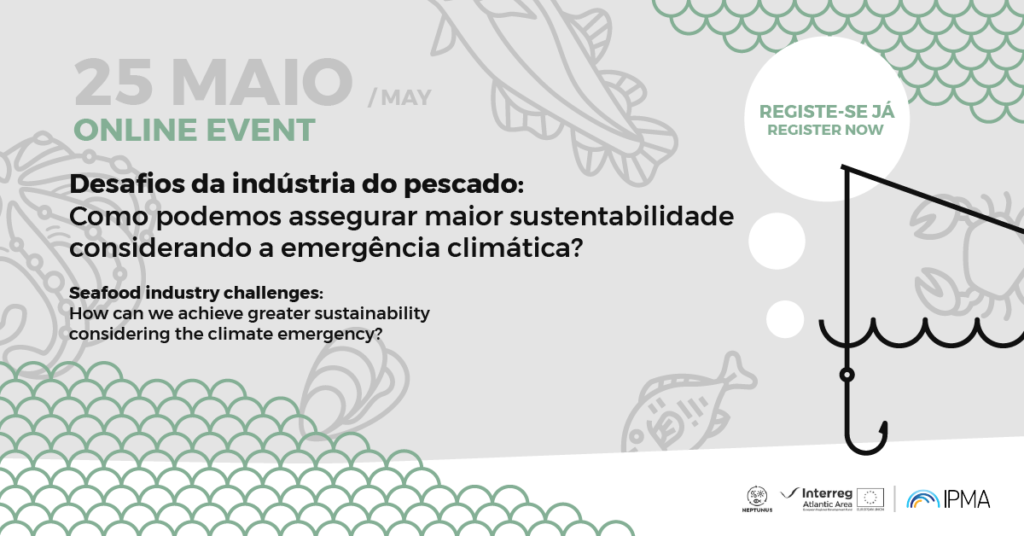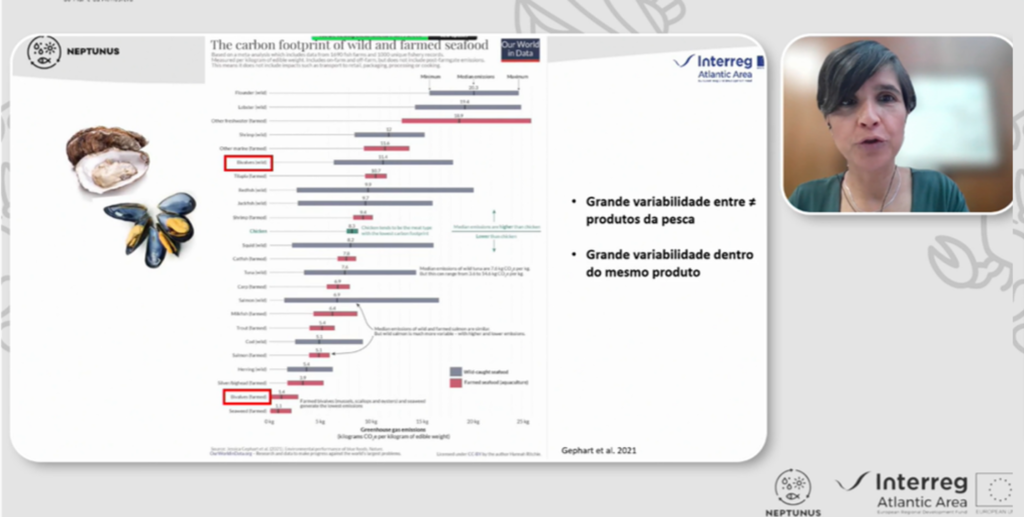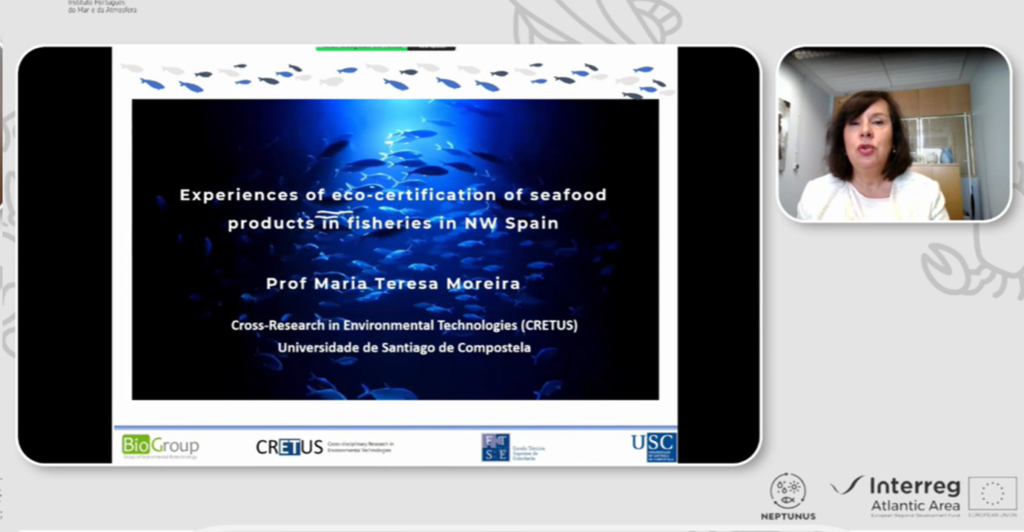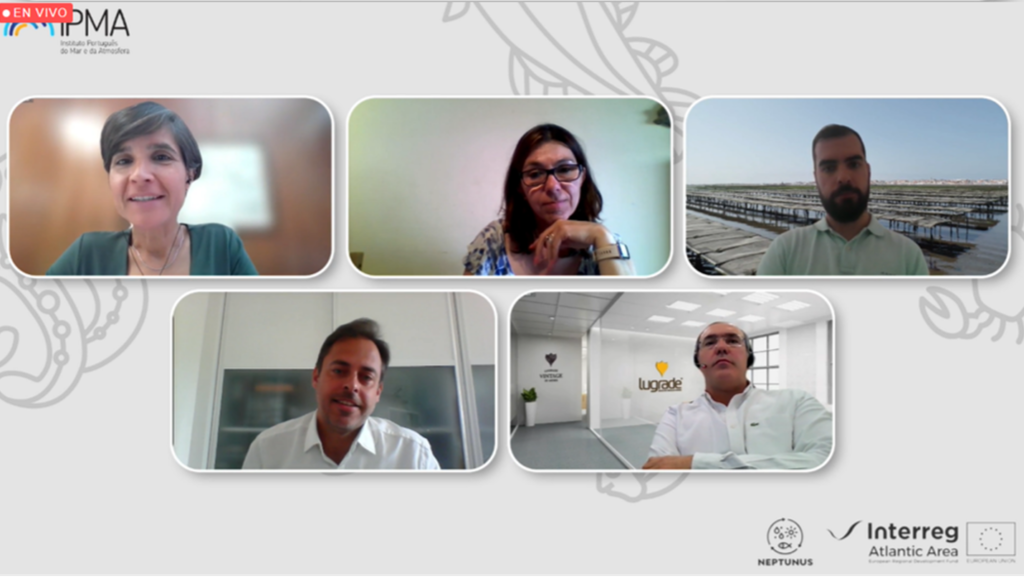25th May
The IPMA team wanted to launch NEPTUNUS topics discussion together with seafood sector stakeholders and organized on the 25th May an online event about: “Seafood industry challenges: How can we achieve greater sustainability considering the climate emergency?”

The event started with Cheila Almeida from Instituto Português do Mar e da Atmosfera (IPMA) presenting some important messages with evidences that 1) the production phase (fishing, aquaculture or agriculture) has usually the largest contribution to GHG emissions from food; 2) seafood is the animal protein with the best environmental performance in terms of carbon footprint; 3) seafood carbon footprint has large variability between species and fishing gears (related mainly to fuel consumption), or production systems (related mainly to feed production); 4) finally, in addition to GHGs emissions other environmental impacts have to be considered when producing seafood, in the case of capture fisheries, for example, fishing stocks management, discards, food web alterations; and in the case of aquaculture, land use and seafloor.

Afterwards, Jara Laso from Universidade da Cantábria (UC) presented the “Life Cycle Assessment (LCA) methodology application, environmental footprints, and environmental product declarations (EPD)” to explain in detail the methodology used to achieve carbon footprints, the type of decisions needed to take during LCA studies, what are the ISO classification to product ecolabelling, and more specifically the type III environmental product declaration, giving an example of an EPD of salmonids products.
The last speaker was Maria Teresa Moreira from Universidade de Santiago de Compostela (USC) that talked about “Experiences of eco-certification of seafood products in fisheries in north-western Spain”. She introduced the topic of ecolabels for food products, explained the methodology behind NEPTUNUS ecolabel, presented her research group experience with pescaenverde, an ecolabel based in carbon footprint for seafood products from Galicia, and finished presenting an analysis of different diets where Atlantic diet seems to be the most balanced diet considering the human health and the planet.

At the end there was a round table with participants from different groups of the seafood sector including Sónia Olim from Associação de Armadores de Pesca da Fuseta (AAPF), a fishermen association of small-scale fisheries in the Algarve; Fábio Barroso from Associação Portuguesa de Aquacultores (APA), the Portuguese Association of Aquaculture producers; Pedro Bastos from Nutrifresco, a relevant company in seafood trading that supplies the catering sector, including some of the best restaurants in Portugal; and Vítor Lucas from Lugrade, one of the main Portuguese companies that process salted and dried cod. The discussion was helpful to understand that companies are willing to promote more sustainable seafood products and doing improvements mainly from packaging or transport. They feel they are part of the society effort to mitigate climate changes but also because policies and funding schemes have introduced these topics. The sector is aware of the changes needed and certification schemes, but Portuguese consumers are less receptive to ecolabels or environmental benefits than countries. Also, much of the seafood products are exported because they have higher quality and consequently get higher market value making imported and cheaper seafood more popular among Portuguese market. The fishermen seem to be ever more sensitive about the damage that fishing activities might cause to marine ecosystems, specially to fishing gears lost.

The event had the goal to disseminate main topics approached by NEPTUNUS project, present proposals on how the seafood sector can mitigate the impacts and adapt to climate change challenges. It was a great opportunity to learn more about seafood sustainability regarding fishing practices and aquaculture production systems, but also on processing and retailing of seafood products in Portugal and where changes are already occurring even though more discussion to clarify several issues on what seafood sustainability “really” means.
Did you miss the seminar? dont’t worry, you can see it on our YouTube channel!
